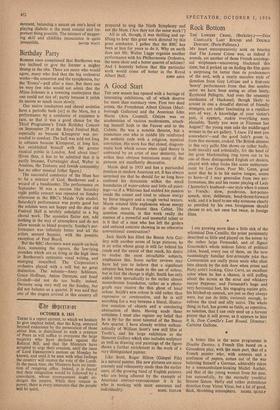Rock Bottom
THE LOWEST CRIME. (Berkeley.)—DoN CAMILLO'S LAST ROUND and DOUBLE DESTINY. (Paris-Pullman.) MY heart uncooperatively sank on hearing that The Lowest Crime was, as indeed it sounds, yet another of those French sociologi- cal stripteases—uncovering blackmail this time; but it perked up on finding the film quite a surprising bit better than its predecessors of the sort, with a neatly macabre style of direction from Guy Lefranc and a first-rate 'heavy' performance from that fine sombre actor we have been seeing so often lately, Raymond Pellegrin. And even the unseemly mechanics of blackmail, though likely to arouse in one a dreadful distrust of friendly strangers, are rather fascinating in a reptilian sort of way. A knowledge of your victim's past, it appears, makes everything seem plausible. 'Surely you were in Florence last August?' the young man asks the middle-aged woman in the art gallery. 'I knew I'd seen you somewhere'—and the good lady's goose is, from that moment, cooked. The British element in this very gallic film shows up rather badly. both morally and artistically, for the head of the great blackmailing ring turns out to be one of those distinguished English art dealers, played with what looks like acute embarrass- ment by Leo Genn. Poor Mr. Genn, good actor that he is in his native tongue, seems to have—if I may generalise from two per- formances, this and his recent playing of Lady Chatterley's husband—one style when it comes to French: slow, ponderous, hot-potato speech, slow, deliberate, head-thrust-forward walk, and it is hard to see why someone clearly so petrified by his own foreignness should choose to act, not once but twice, in foreign films.
I am growing more than a little sick of the whimsical Don Camillo, the priest persistently described as little and played on the screen by the rather large Fernandel, and of Signor Guareschi's whole tedious fabric of political jokes, based, every one of them, on the now nauseatingly familiar first-principle joke that Communists are really pious souls who slink into church by the side door when priest and Party aren't looking. Gino Cervi, an excellent actor when he has a chance, is still puffing about the screen as the stout and whiskery mayor Peppone; and Fernandel's huge and very horizontal feet, his engaging equine grin, his hitched-up cassock, are just as they always were, but can do little, curiously enough, to enliven the tired and silly satire. The whole thing, in fact, has grown so futile, so repetitive, so tasteless, that I can only send up a fervent prayer that it will prove, as it appears to hint it is, Don Camillo's Last Round. Director: Carmine Gallone.
A better film in the same programme is Double Destiny, a French film based on a Giraudoux play, with the main part, that of a French painter who, with amnesia and a confusion of papers, comes out of the war believing himself a German, admirably taken by a somnambulant-looking Michel Auclair, and that of the young woman from his past, less successfully, by the eternally youthful Simone Simon. Hefty and rather pretentious direction from Victor Vicas, but a lot of good, thick, throbbing atmosphere. ISABEL QUIGLY


















































 Previous page
Previous page